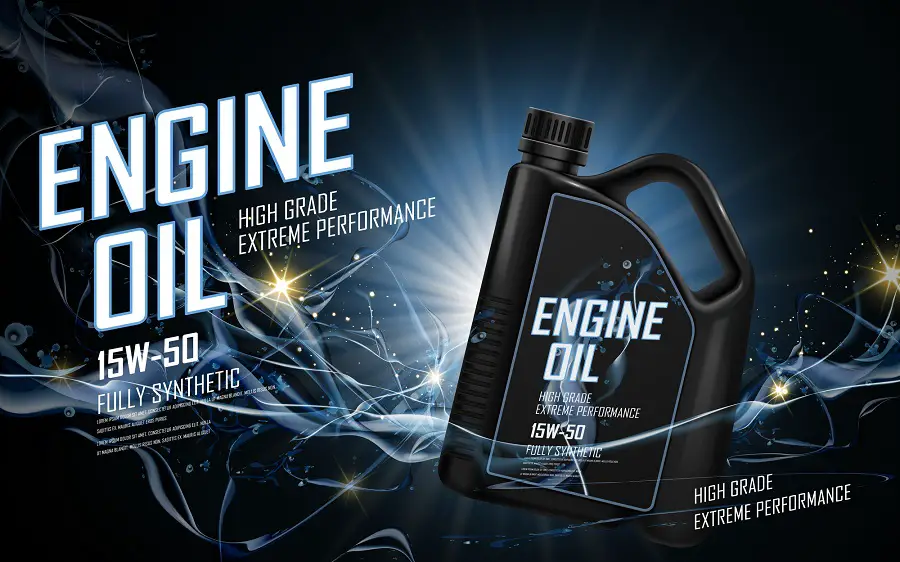Using winter-specific products during the cold months ensures the drivability and performance of your vehicle, including choosing a winter-appropriate motor oil.
In this article, we’ll provide you with all the information you need to determine what kind of motor oil for cold weather is best for your car.
Types of Motor Oils
There are four basic types of motor oil: conventional oil, full synthetic oil, blended synthetic oil, and high mileage oil.
First, you need to understand the basic oil types and their classifications. Knowing the differences will help you make an informed decision about your choice of motor oil for cold weather.
Conventional Oil
Conventional motor oil is the traditional kind of motor oil and contains the highest levels of impurities because companies derive it from raw petroleum deposits. It tends to be the cheapest and has the highest viscosity.
Full Synthetic Oil
Full synthetic motor oil is often the oil of choice for modern vehicles. It is created with synthetic oils specifically formulated to protect the vehicle’s engine, improve gas mileage, and flow with a lower viscosity.
Blended Synthetic Oil
Chemists formulate synthetic motor oil by blending conventional organic and synthetic oils. Drivers often use it in heavy-duty vehicles to balance the benefits of a higher-performance synthetic oil with the affordability of conventional motor oils.
High Mileage Oil
Companies formulate high mileage motor oils to address the needs of older vehicles and new vehicles with high mileage whose engines need a bit more protection and TLC.
These motor oils are typically full synthetic or blended synthetic oils that contain additives to help protect against motor leaks and damage to the engine.
How Does Cold Temperature Affect Motor Oil?
Cold weather can affect the ability of the motor oil to properly and effectively flow through your engine. Cold temperatures cause some motor oils to become too thick, raising the viscosity of the oil.
When your engine isn’t properly coated in engine oil, it can cause severe problems in the engine due to metal parts grinding against each other. If the engine oil doesn’t flow at all, the engine could be irreparably damaged.
Motor oil that works well in the winter needs to maintain low viscosity and flow in cold temperatures. Viscosity measures how resistant a liquid is to flowing or changing shape. So, the lower the viscosity of a fluid, the easier and faster it flows.
Choosing a Winter-Appropriate Motor Oil
Now that you’re familiar with the basic types of motor oils and the importance of oil formulated for winter use, we’ll be covering how to choose a specific motor oil for cold weather.
The “W” Stands for “Winter”
Winter-appropriate motor oil formulations are so important that the winter rating of an oil is stamped right onto the bottle.
A 5W-30 bottle of synthetic motor oil, for example, means that the formulation has a winter rating of 5. 10W-30 conventional motor oil has a winter rating of 10. So what does this mean exactly?
The rating measures how low viscosity the formation is at zero degrees Fahrenheit. The lower the number before the “W”, the lower the viscosity of the formulation. For cold weather, you generally want to look for a winter rating of 5 or less on the motor oil bottle.
Full and Blended Synthetics vs Conventional
Full synthetic oils are thinner than conventional oils because they don’t contain waxes.
In warm and hot temperatures, the waxes in conventional motor oil maintain a low viscosity. However, once waxes get exposed to cold temperatures, they thicken, causing the motor oil to become highly viscous and slow-moving.
Blended synthetic oils may contain some of the impurities of conventional oils, but the synthetic aspects of the blend provide the oil with excellent cold-weather performance.
Best Motor Oil for Winter
For the best motor oil for cold locations, based on the performance and protection of your engine, we suggest using a synthetic motor oil or synthetic oil blend with a winter rating of 5 or less.
Even if you use conventional motor oil during the warm months, it’s a good idea to switch over to synthetic for the winter if your climate experiences freezing and below-freezing temperatures.
If your vehicle has over 75,000 miles on it, then consider purchasing a high mileage synthetic motor oil with an appropriate winter rating.
Additional Considerations
While choosing effective motor oil for cold weather is a large part of ensuring the longevity and drivability of your vehicle, you’ll also need to make sure your vehicle is running on clean oil.
Switching motor oil for the winter is a great time to get or perform an oil change. Dirty oil contains contaminants that raise the viscosity of your vehicle, even if it’s formulated for winter use.
So, start the winter out right with a fresh oil change and the addition of winter-appropriate synthetic motor oil with a winter rating of 5 or less.







